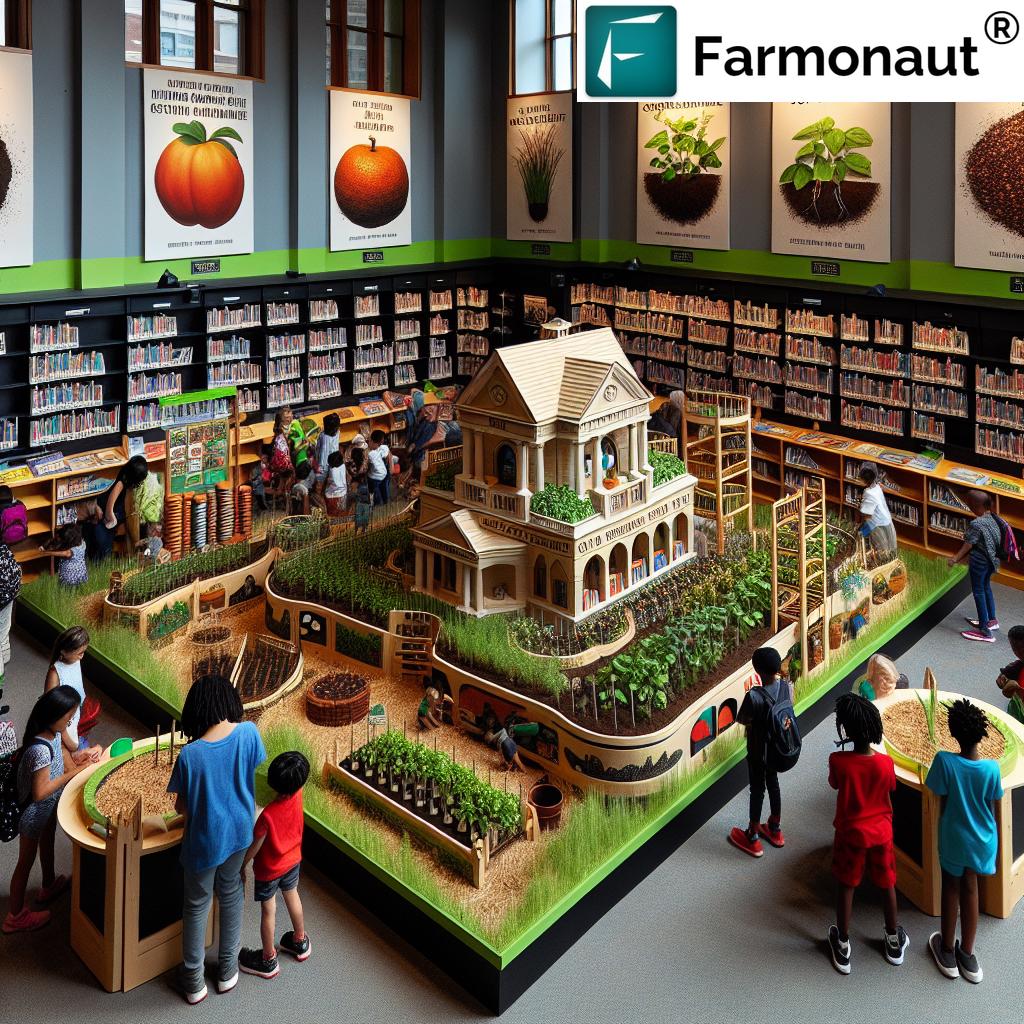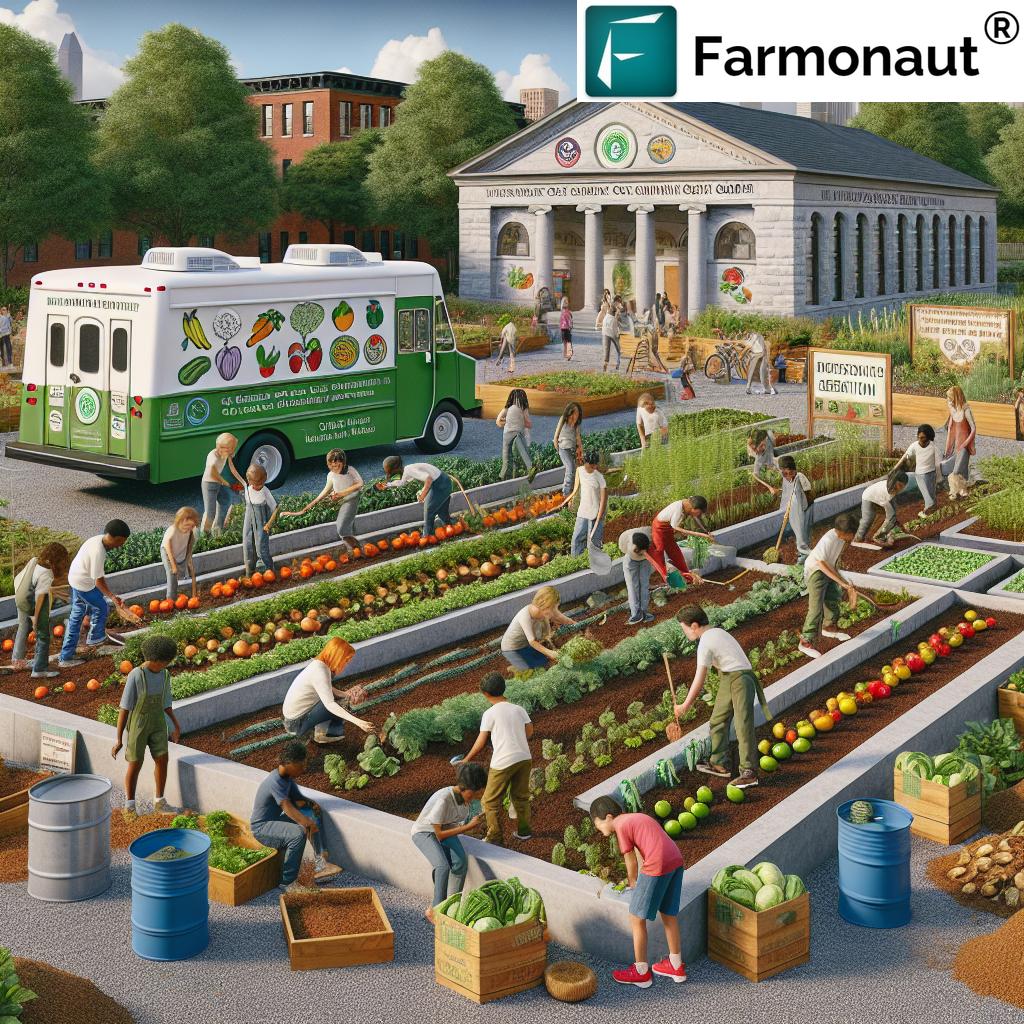Boosting Agricultural Literacy in Georgia: Sustainable Gardening Education Grows in Public Libraries

“Georgia’s agricultural literacy program aims to donate educational books to over 400 public libraries across the state.”
In the heart of the Peach State, we’re witnessing a remarkable transformation in agricultural education. Georgia’s agricultural literacy programs are blossoming, nurturing a new generation of environmentally conscious citizens and potential future farmers. We’re excited to share how sustainable gardening education is taking root in public libraries across Georgia, fostering a love for agriculture among children and adults alike.
The Seed of Knowledge: Farm to Library Book Donations
At the core of this initiative is a collaborative effort between the Georgia Foundation for Agriculture (GFA), Georgia Farm Bureau, and Georgia Electric Membership Corporation (EMC). Together, these organizations are sowing the seeds of agricultural knowledge by donating copies of the children’s book “The Soil in Jackie’s Garden” to nearly 400 libraries within the Georgia Public Library Service (GPLS).
This groundbreaking partnership ensures that every county Farm Bureau in Georgia receives enough books to supply each public library in their respective counties. For instance, Thomas County Farm Bureau recently delivered copies to all six public libraries in Thomas County, exemplifying the widespread reach of this program.
Cultivating Young Minds: “The Soil in Jackie’s Garden”
The chosen book, “The Soil in Jackie’s Garden,” written by Peggy Thomas and beautifully illustrated by Neely Daggett, is more than just a story. It’s a gateway to the wonders of gardening and the secrets of soil. Through the adventures of Jackie and her garden friends, young readers embark on a journey of discovery, learning about:
- The joy of planting a garden
- Nurturing and harvesting their own food
- The magic of composting
- Recycling scraps to create nutrient-rich soil
This engaging narrative introduces children to the cyclical nature of growth and sustainability in agriculture. It’s no wonder the American Farm Bureau Foundation for Agriculture selected it as its 2025 Book of the Year, recognizing its accurate and positive portrayal of agriculture.
Rooting for Success: The Georgia Foundation for Agriculture
The GFA, a non-profit 501(c)3 organization, is at the forefront of preparing the next generation of leaders for success in Georgia agriculture. Their mission extends beyond book donations, encompassing a range of initiatives:
- Offering scholarships to students pursuing agricultural careers
- Funding leadership development programs
- Supporting projects that increase public understanding of agriculture
One of their most innovative projects is the Georgia Ag Experience, a mobile classroom that introduces third through fifth graders to Georgia’s top crops. This hands-on approach to learning brings the farm directly to students, igniting their curiosity about agriculture.
Explore Farmonaut’s cutting-edge agricultural solutions:
Cultivating Sustainable Practices: Garden Composting for Sustainability
One of the key aspects of agricultural literacy being promoted through these programs is the importance of sustainable gardening practices, particularly composting. We’re seeing a growing emphasis on teaching children and adults alike about the benefits of garden composting:
- Reducing waste and landfill contributions
- Creating nutrient-rich soil for healthier plants
- Conserving water by improving soil structure
- Decreasing the need for chemical fertilizers
By introducing composting concepts through engaging stories and hands-on activities, these programs are laying the groundwork for a more sustainable future in agriculture.
From Garden to Table: Gardening and Harvesting for Kids
The agricultural literacy programs in Georgia go beyond theory, encouraging practical skills in gardening and harvesting. Children are learning:
- How to plan and plant a garden
- The importance of soil health and proper watering
- Techniques for natural pest control
- When and how to harvest different crops
These hands-on experiences not only teach valuable skills but also foster a deeper connection to food production and an appreciation for the effort that goes into growing our food.
Nurturing Future Leaders: Agricultural Leadership Development
As we look to the future of agriculture in Georgia, leadership development plays a crucial role. The GFA and its partners are invested in nurturing the next generation of agricultural leaders through various initiatives:
- Youth leadership programs focused on agricultural issues
- Mentorship opportunities with experienced farmers and agricultural professionals
- Workshops on agricultural policy and advocacy
- Networking events connecting young agriculturists with industry leaders
These programs are designed to equip young people with the skills, knowledge, and connections they need to become effective leaders in the agricultural sector.
Discover Farmonaut’s mobile solutions for precision agriculture:
Soil Education for Children: The Foundation of Agricultural Literacy
At the heart of these agricultural literacy programs is a focus on soil education. Children are learning about:
- The composition of healthy soil
- The role of microorganisms in soil health
- How different plants interact with and affect soil
- The importance of soil conservation
By understanding the fundamental role of soil in agriculture, children gain a deeper appreciation for the complexities of farming and the importance of sustainable practices.
Mobile Classroom for Crop Education: Bringing the Farm to Students
“Mobile classrooms in Georgia introduce students to the state’s top 5 crops and agricultural leadership development opportunities.”
The Georgia Ag Experience, a mobile classroom initiative, is revolutionizing how students learn about agriculture. This innovative program:
- Travels to schools across Georgia
- Provides interactive exhibits on the state’s top crops
- Offers hands-on learning experiences with agricultural technology
- Connects students with agricultural professionals
By bringing the farm directly to students, this mobile classroom makes agricultural education accessible and engaging, sparking interest in farming careers and sustainable practices.
Promoting Agriculture in Public Libraries: A Community Approach
Public libraries have become key partners in promoting agricultural literacy. Beyond hosting book donations, libraries are expanding their role by:
- Organizing gardening workshops for all ages
- Hosting seed libraries for community members
- Offering space for agricultural expert talks and demonstrations
- Creating displays that highlight local farming history and practices
This community-centered approach ensures that agricultural education reaches a broad audience, fostering a culture of sustainability and environmental stewardship.
Explore Farmonaut’s API for agricultural data integration:
Farmonaut API | API Developer Docs
Agricultural Scholarships in Georgia: Investing in the Future
To support the next generation of agricultural professionals, various organizations in Georgia offer scholarships to students pursuing agricultural careers. These scholarships:
- Cover a range of agricultural disciplines
- Support both undergraduate and graduate studies
- Often include mentorship opportunities
- Encourage recipients to give back to their communities
By investing in education, these scholarship programs are ensuring a bright future for Georgia’s agricultural sector.
Sustainable Gardening Practices: A Cornerstone of Agricultural Education
Throughout these educational initiatives, there’s a strong emphasis on sustainable gardening practices. Students and community members are learning about:
- Water conservation techniques in gardening
- Natural pest control methods
- Crop rotation and its benefits
- The importance of biodiversity in gardens
These practices not only contribute to healthier gardens but also instill a sense of environmental responsibility in learners of all ages.
The Impact of Georgia’s Agricultural Literacy Programs
To better understand the scope and impact of these initiatives, let’s take a look at a comprehensive table showcasing Georgia’s Agricultural Literacy Programs:
| Program Type | Target Audience | Key Activities | Estimated Annual Reach |
|---|---|---|---|
| Library Book Donations | Children and Families | Distribution of agricultural books, storytelling sessions | 100,000+ library patrons |
| Mobile Classrooms | 3rd-5th Grade Students | Interactive exhibits, hands-on learning about top crops | 50,000 students |
| School Gardens | K-12 Students | Planting, maintaining, and harvesting school gardens | 75,000 students |
| Agricultural Leadership Development | High School and College Students | Workshops, mentorship programs, networking events | 5,000 young leaders |
This table illustrates the diverse range of programs and their significant reach across different age groups and communities in Georgia.
The Role of Technology in Modern Agriculture
As we educate the next generation about agriculture, it’s crucial to highlight the role of technology in modern farming practices. Companies like Farmonaut are at the forefront of this agricultural revolution, offering innovative solutions that combine satellite technology, artificial intelligence, and data analytics to enhance farming efficiency and sustainability.
While Farmonaut is not directly involved in Georgia’s agricultural literacy programs, its technologies represent the kind of advancements that students learning about agriculture today might use in their future careers. These technologies include:
- Satellite-based crop health monitoring
- AI-driven farm advisory systems
- Precision agriculture tools for resource optimization
- Blockchain-based traceability solutions for supply chains
By introducing students to these concepts, we’re preparing them for the future of agriculture where technology plays a pivotal role in sustainable farming practices.
The Future of Agricultural Literacy in Georgia
As we look to the future, the agricultural literacy programs in Georgia are poised for continued growth and impact. We anticipate:
- Expanded partnerships between educational institutions and agricultural organizations
- Increased integration of technology in agricultural education
- More emphasis on sustainable and regenerative farming practices
- Greater focus on urban agriculture and community gardening
These evolving programs will play a crucial role in shaping a sustainable and technologically advanced agricultural sector in Georgia.
Frequently Asked Questions
- What is agricultural literacy?
Agricultural literacy refers to an understanding of the food and fiber system, including its history and current economic, social, and environmental significance. - How can I get involved in agricultural literacy programs in Georgia?
Contact your local Farm Bureau, public library, or the Georgia Foundation for Agriculture for information on volunteer opportunities and local programs. - Are these programs only for children?
While many programs target youth, there are also initiatives for adults, including community workshops and gardening classes at public libraries. - How does agricultural literacy benefit the community?
It promotes understanding of food production, encourages sustainable practices, and can inspire careers in agriculture and related fields. - Can technology like Farmonaut’s be used in educational programs?
While not directly involved in these programs, technologies like Farmonaut’s represent the future of agriculture and could be incorporated into advanced agricultural education curricula.
Conclusion: Cultivating a Sustainable Future
The agricultural literacy programs sprouting across Georgia are more than just educational initiatives; they’re sowing the seeds for a sustainable and environmentally conscious future. By combining hands-on learning experiences with cutting-edge agricultural concepts, these programs are nurturing a generation that understands the importance of sustainable farming practices, soil health, and the role of technology in modern agriculture.
From the pages of “The Soil in Jackie’s Garden” to the interactive displays of mobile classrooms, Georgia’s children are gaining invaluable insights into the world of agriculture. As these young minds grow, so too will their appreciation for the complexities of food production and the critical role of sustainable practices in feeding our world.
We invite you to support these initiatives, whether by volunteering at your local library, participating in community gardening projects, or simply engaging with the agricultural education resources available in your area. Together, we can cultivate a future where agricultural literacy flourishes, ensuring that the next generation is well-equipped to tackle the challenges of sustainable food production in an ever-changing world.
Earn With Farmonaut: Join our Affiliate Program!
Earn 20% recurring commission with Farmonaut’s affiliate program by sharing your promo code and helping farmers save 10%. Onboard 10 Elite farmers monthly to earn a minimum of $148,000 annually—start now and grow your income!
Learn More About Our Affiliate Program
Explore Farmonaut’s Subscription Options

















